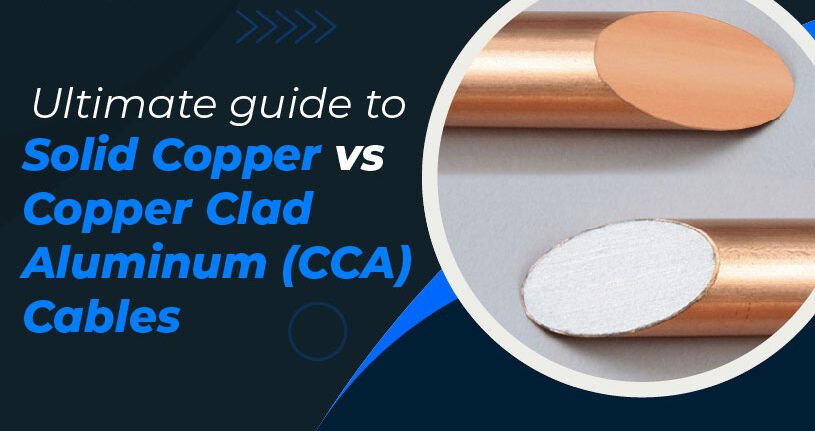Uncategorized
LAN Cabling CCA vs pure copper ethernet cables in kenya
CCA versus pure copper ethernet cables: Key differences
The choice between Copper Clad Aluminum (CCA) and pure copper ethernet cables depends on your network’s needs, specifically for performance, reliability, and safety. CCA cables are a cost-effective option for light, temporary use over short distances, while pure copper cables are the industry standard for reliable, high-performance networks, and they are required for Power over Ethernet (PoE) applications.
Pure copper cables
Pure copper ethernet cables use 100% copper conductors for optimal conductivity, durability, and safety. This is the industry-standard choice for network installations and is required by building codes.
- Superior conductivity: Copper’s lower electrical resistance ensures a strong, stable data signal over longer distances, up to 100 meters.
- Safety and PoE support: Pure copper cables have a much lower resistance than CCA, so they don’t heat up as much when conducting electricity. This makes them safe for Power over Ethernet (PoE) applications, which can deliver up to 90W of power through the ethernet cable.
- Durability and longevity: More flexible and less brittle than CCA, pure copper cables can withstand bending and movement during installation without breaking. They also don’t oxidize as easily at termination points, ensuring a long-lasting connection.
- Guaranteed performance: These cables meet strict industry standards from organizations like TIA, UL, and ETL, ensuring certified performance. In contrast, CCA cables fail certification tests for ethernet applications.
CCA (Copper Clad Aluminum) cables
CCA cables have an aluminum core with a thin layer of copper coating. While they are a cheaper and lighter alternative, their performance and safety are significantly compromised.
- Inferior performance: Because aluminum has higher electrical resistance, CCA cables experience greater signal loss (attenuation) and interference (crosstalk). This leads to slower, less reliable data speeds, especially over longer distances.
- High-risk for PoE: The higher resistance of aluminum causes CCA cables to heat up significantly under load. In PoE applications, this can lead to overheating, voltage drops, potential damage to connected devices, and fire hazards.
- Physical fragility: The aluminum core is more brittle than pure copper and can easily break or crack when bent. This makes installation difficult and can lead to connection failures over time.
- Oxidation issues: Aluminum oxidizes quickly when exposed to air, such as at a cable’s termination point. Unlike copper oxide, aluminum oxide is not conductive, which can cause connection failures.
Which ethernet cable should you buy to meet your network cabling needs ?
Cat6 (1G) pure copper:
- Recommendation: Ideal for most standard office and home network applications that require reliable 1 Gigabit Ethernet speeds and support for PoE.
- Distance: Supports 1 Gigabit speeds up to 100 meters.
- Key products:
- Siemon , Goganet, D-Link APS Finland , Molex ; (CAT6 and Cat6a Pure copper that feature 23AWG solid bare copper conductors and supports 1Gbps speeds up to 100 meters, according to TDK Solutions Ltd..
- Local brands such as Hikvision, Easnet, ACP 1000ft (305m) 23AWG Solid Pure Bare Copper Wire:Also available in Kenya and able to support 1Gbps up to 550MHz,
Cat6a (10G) pure copper:
- Recommendation: Necessary for high-performance networks, such as data centers or for use with modern WiFi 6 access points, where sustained 10 Gigabit speeds and high-power PoE are required. Distance: Supports 10 Gigabit speeds up to 100 meters.
- Key products:
- Siemon, Giganet, Molex ,D-link Cat 6A Ethernet LAN Cable-S/FTP Pure Copper:A shielded cable built for reliable 10G networks
CCA cables (1G, 10G):
- Recommendation: Not recommended for any permanent or mission-critical installations. The significant risks related to performance, durability, and safety, especially for PoE applications, outweigh the lower initial cost.
- Distance: Performance significantly degrades over longer distances, and they are typically only reliable for runs shorter than 50 meters.
- Safety: Not suitable for any Power over Ethernet (PoE) applications due to the fire hazard risk caused by high resistance and heat buildup.
- Key products:
- RD-Com CAT 6e CCA Ethernet LAN Cable: An affordable, CCA-based cable for low-demand applications and short distances
- Mercury/CPK Cable UTP Cable CAT6 – 305 Meter (CCA): A CCA bulk cable option for non-critical, short-distance runs,


